The deadly attacks in Paris underscore the ongoing and urgent need to continue destroying the Islamic State terrorist group, military officials in Iraq and Kuwait said Monday.
"This enemy is in no way defeated yet," said Col. Chris Garver, a spokesman for Combined Joint Task Force-Operation Inherent Resolve. "I think it shows the entire world this is an enemy that has to be dealt with, or you're going to end up with more attacks like we saw in Paris."
A series of coordinated attacks across Paris on Friday night killed 129 people and injured more than 300 others.
France launched "massive" airstrikes on the Islamic State group's de-facto capital in Syria, while local authorities in France and elsewhere continue to hunt for more members of the sleeper cell that carried out Friday's deadly attacks, the Associated Press reported.
The French strikes were a "national mission" supported by the coalition, Garver said, adding that France has officers serving in the Operation Inherent Resolve headquarters as well as trainers who are advising troops in Iraq.
The coalition struck targets of its own alongside the French, including destroying 116 oil trucks Sunday night as part of Operation Tidal Wave II, which targets ISIL's oil revenue streams, Garver said.
Every member of the coalition that's part of Operation Inherent Resolve, which is supporting the fight against the Islamic State in Iraq and Syria, is watching this carefully, Garver said.
"Our support goes out to the Parisians who lost their lives in the attack," he said. "We're trying to prevent that from happening anywhere ever again. We have to beat this enemy."
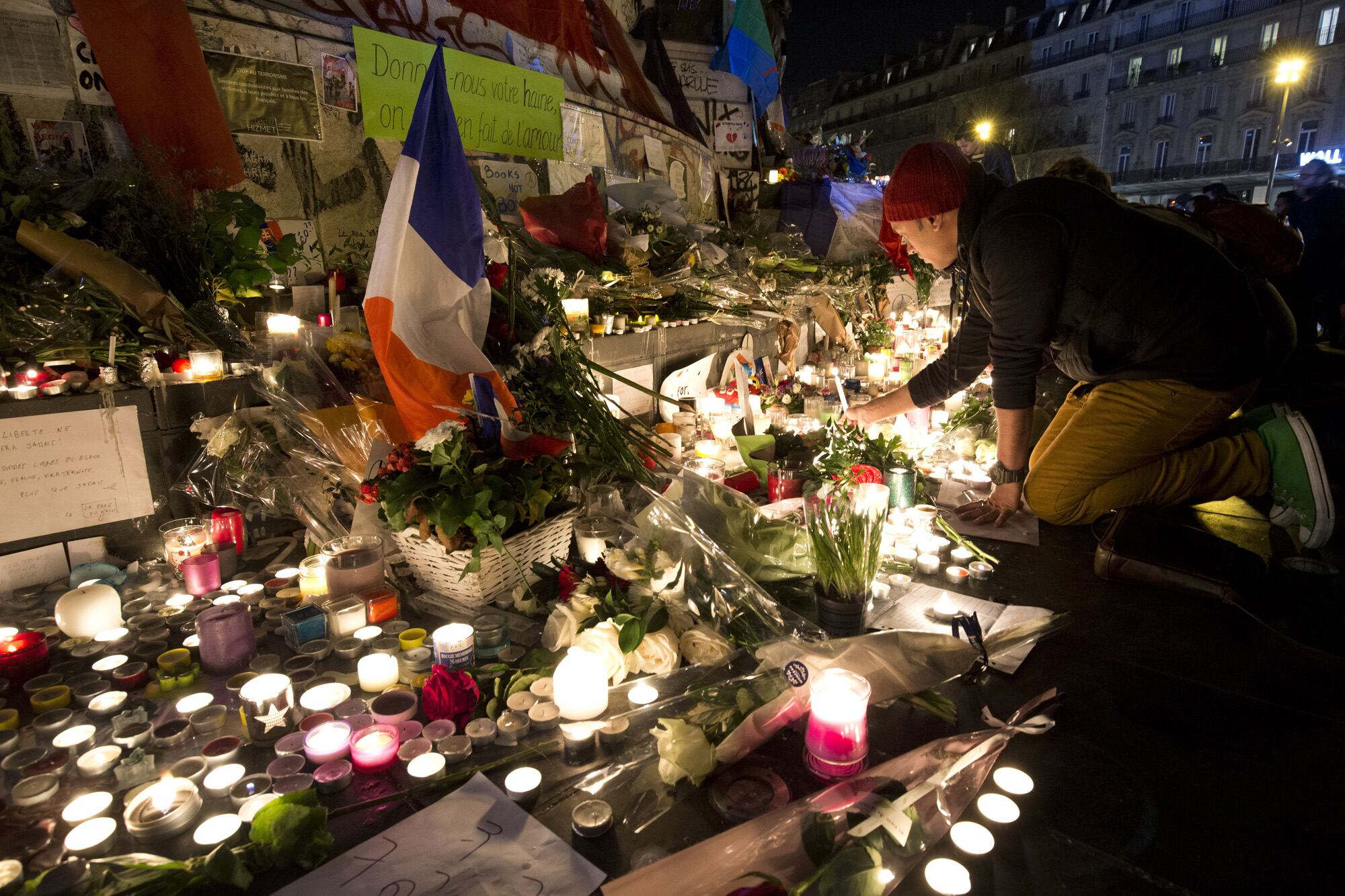
A man lights a candle at a makeshift memorial in tribute to the victims of Paris' attacks' on Nov. 15 at the place de la Republique in Paris.
Photo Credit: Joel Saget/AFP via Getty Images
Garver declined to discuss what, if any, increased force protection measures were put in place after Friday's attacks. Force protection was already a priority, he said.
"We're already very concerned about the force protection of our soldiers and all coalition troops on the ground," he said. "In terms of specific changes based on last Friday's horrific attack, we haven't made significant changes but wouldn't discuss them if we did."
The U.S. has about 3,500 troops in Iraq training and advising Iraqi Security Forces as they work to push back the Islamic State from cities such as Bayji, Ramadi and Sinjar.
Most American troops are on bases, training the Iraqis at the division level, Garver said. Some coalition nations' special operations forces are advising at lower levels, he said.
Advise-and-assist operations carried on as scheduled after the Paris attacks, Garver said, including the troops who accompanied the Ppeshmerga as they attacked Sinjar to reclaim it from the Islamic State.
"They're back [away] from the front lines, but they were providing assistance on employment of fires, air, and whatever the ground commander needed assistance on, if it's advice on maneuver or something else," he said.
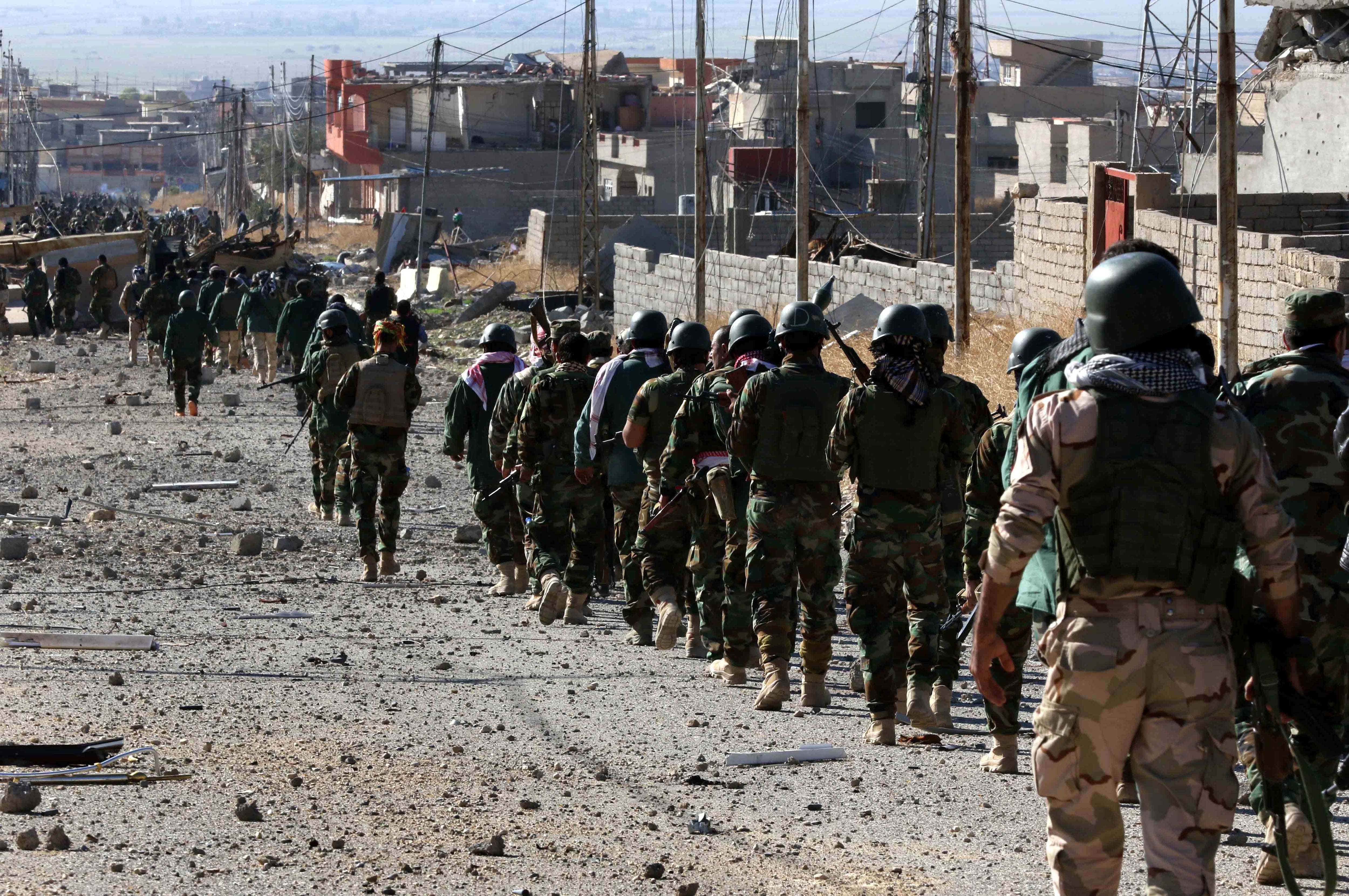
Iraqi autonomous Kurdish forces and fighters from the Yazidi minority enter the northern Iraqi town of Sinjar on Nov. 13. Iraqi Kurdish leader Massud Barzani announced the "liberation" of Sinjar from the Islamic State group in an assault backed by U.S.-led airstrikes that cut a key jihadist supply line with Syria.
Photo Credit: Safin Hamed/AFP via Getty Images
Called "Operation Free Sinjar," the offensive operation launched on Thursday to clear the area and seize portions of Highway 47 of the Islamic State.
Highway 47 is a significant supply route for the terror group between Ar Raqqah, Syria, and Mosul, Iraq.
At the same time, Iraqi forces are preparing to launch major operations in Fallujah, Ramadi, and near al-Baghdadi between Hit and Haditha, Garver said. Coalition airstrikes, including those launched over the weekend by the French, are targeting the Islamic State in Ar Raqqah, while moderate Syrian fighters are hitting back in Al Hawl in eastern Syria. The U.S.-led coalition also has been attacking the Islamic State-controlled oil fields at Dayr az Zawr in eastern Syria, which are a large source of the terrorist group’s revenue, Garver said.
"All of these things are connected together, to put pressure on ISIL all over the place," Garver said.
The Iraqis are firmly in the lead for this fight, Garver said.
"It's on the Iraqi timetable for fighting in Iraq," he said. "The Iraqis literally are the ones designing the campaign plan."
The U.S.-led coalition is "very carefully monitoring the speed of the operations," Garver said.
"There are times we may think we can go faster, but it is an Iraqi campaign that we are supporting," he said. "We want to make sure we're supporting their fight."
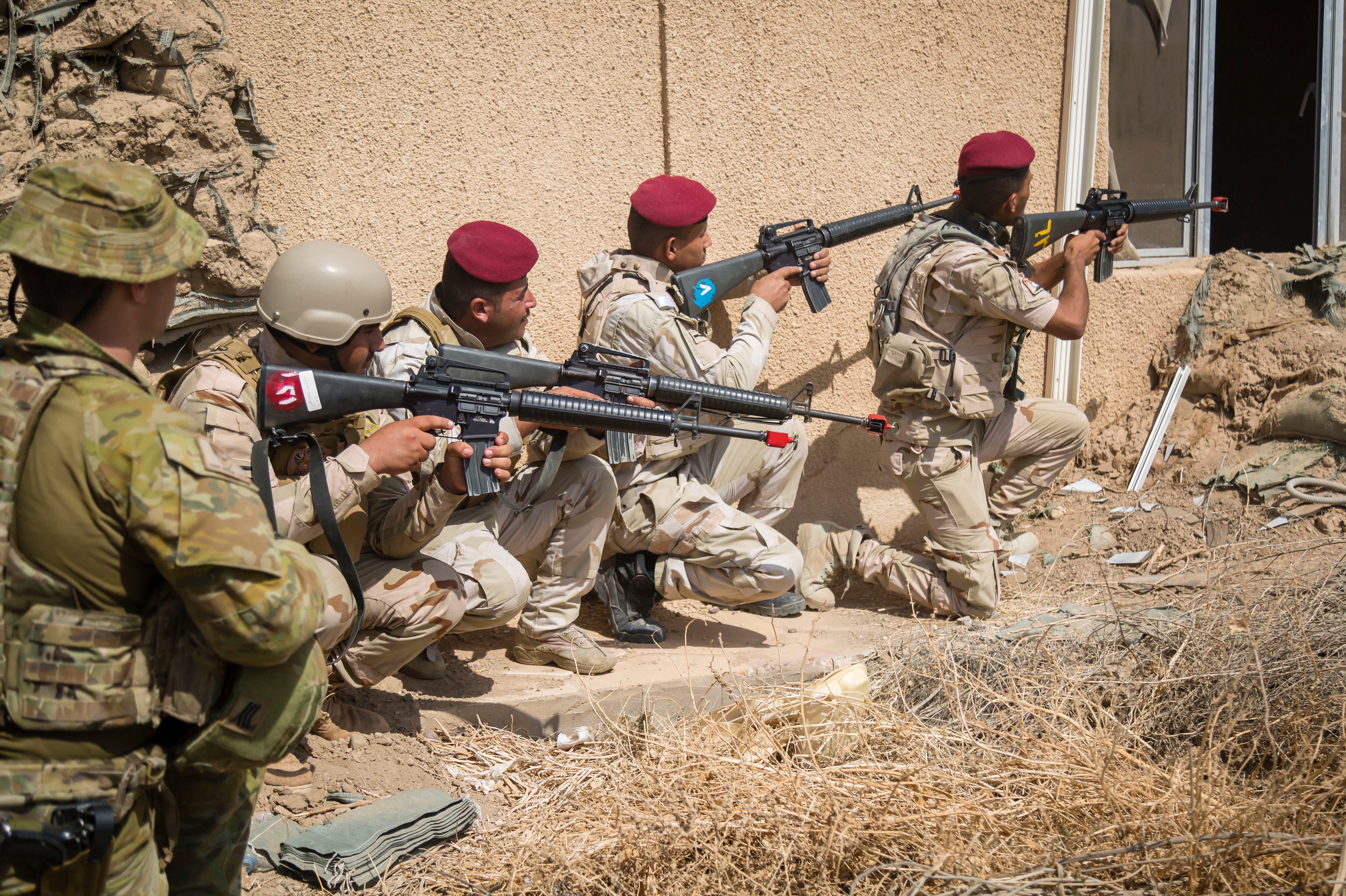
Iraqi soldiers attending a train-the-trainer course on Sept. 30 prepare to clear a building during urban operation training at the Iraqi Army Noncommissioned Officer Academy at Camp Taji, Iraq.
Photo Credit: Spc. William Marlow/Army
One challenge they face is in the training they need to properly fight the Islamic State.
"It's an Iraqi army that was designed as a counter-insurgency army but has had to turn into a conventional force," Garver said.
The Iraqi army also had "whole parts" fall apart last year when ISIS marched into Iraq.
"We are very concerned about the Iraqi Security Forces, [and] their ability to conduct breaching operations and fight in a more conventional role," Garver said.
U.S. and coalition trainers have adjusted their training to include combined arms breaching training, he said.
"One of the tactics that we've noticed from ISIL is that they are using IEDs as mines, and they're building actual minefields with IEDs, so we've brought in specialized engineering equipment for breaching and teaching the Iraqis how to use it," Garver said.
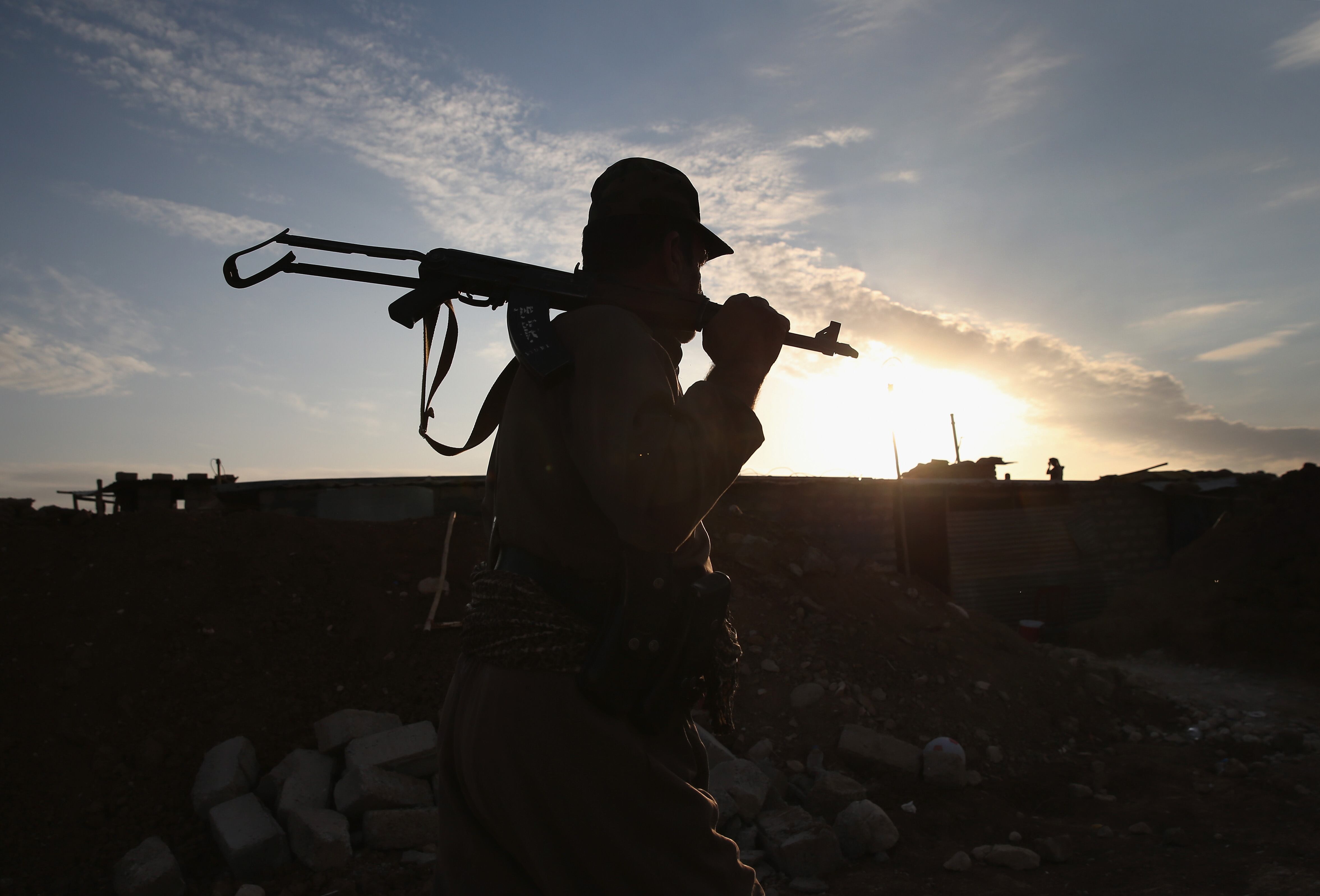
On Nov. 5., near the frontline with ISIS fighters in Telskuf, northern Iraq.
Photo Credit: John Moore
This includes the Mine Clearing Line Charge, or MICLIC. The MICLIC propels a line charge over the mine field by a MK22 5-inch rocket motor and detonates it, clearing a lane in the minefield, according to the Army's Project Manager, Close Combat Systems.
Also being used is the Antipersonnel Obstacle Breaching System, or APOBS, which is a similar to the MICLIC but small enough to be carried by two soldiers, and dozers, Garver said.
The IED-seeded minefields make "assaults by Iraqis very slow," especially as these improvised explosive devices have the capability to take out large numbers of soldiers at once, he said.
"That's why the fight in Ramadi is as slow and deliberate as it is," Garver said. "It's a slow crawl up against these belts of IEDs and mines and machine-gun fire."
The Islamic State terror group also is showing some World War I-like tactics, Garver said.
"ISIL is dug in like a conventional force," he said. "They use tunnels to maneuver, they use obstacles. They are using conventional tactics, trenches, berms, that's a different style of fighting than a counter-insurgency army."
So the training provided by the U.S. and coalition has evolved to reflect that, he said.
"We're trying to adjust the training to fit what they're going to face and what they're facing on the battlefield," he said.
Despite popular opinion, the Iraqis are making progress against ISIS, Garver said.
The terror group has not gained any territory, and is in fact losing ground, he said, citing the hard-fought Bayji as an example.
Today, the Iraqis hold Bayji, while the Peshmerga have retaken Sinjar even though they're still going through the hard work of clearing the city, Garver said.
"You don't see ISIL making advances on terrain right now," he said. "You see us stopping them and pushing them back and trying to take terrain back."
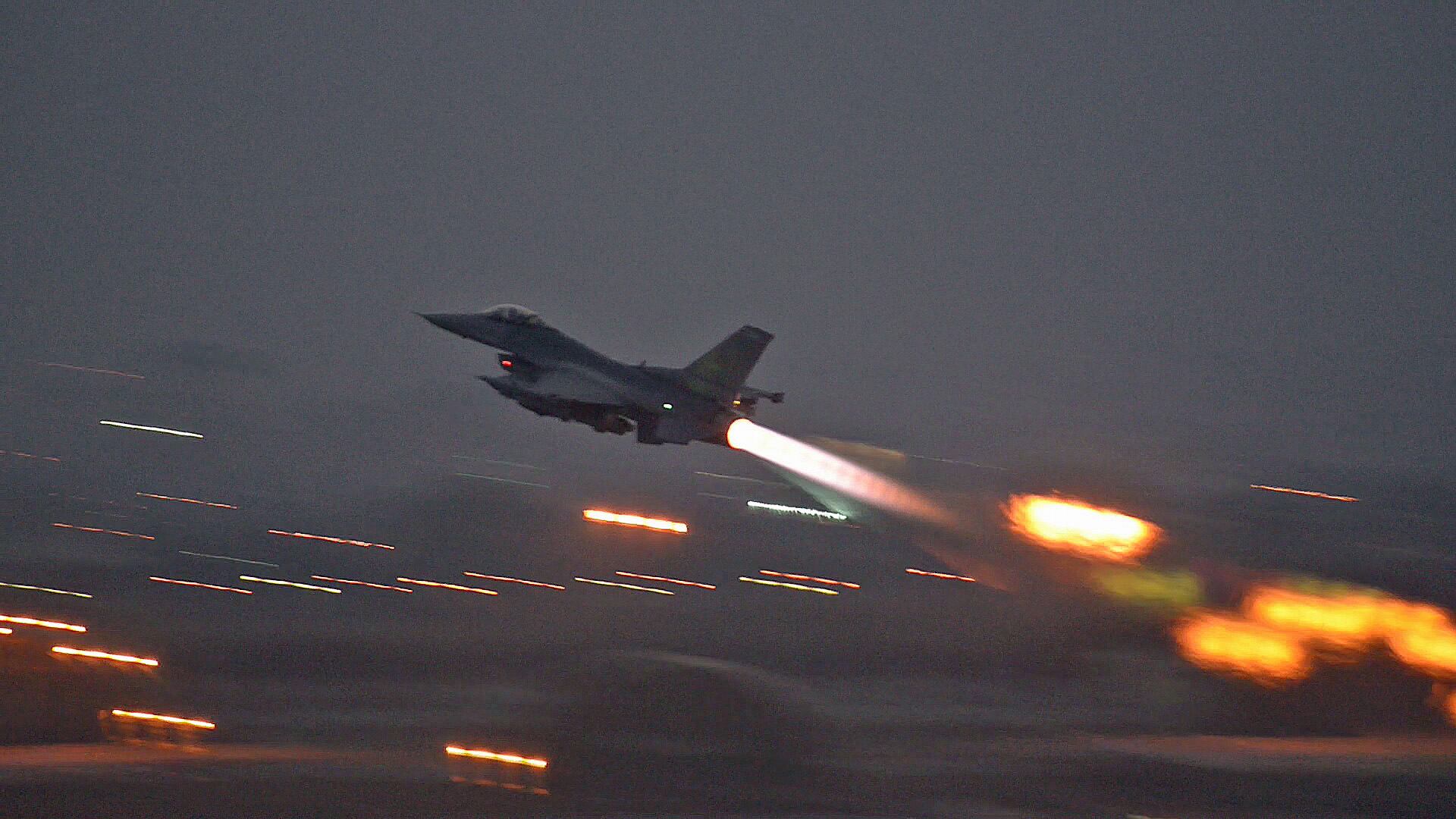
An F-16 Fighting Falcon takes off Aug. 12 at Incirlik Air Base, Turkey, in support of Operation Inherent Resolve.
Photo Credit: Senior Airman Krystal Ardrey/Air Force
The U.S. initially assessed the fight against the Islamic State would take three to five years, Garver said.
"We just completed the first year of that fight," he said.
The U.S. and coalition must show that the Islamic State, which is trying to govern from Ar Raqqa, is not a viable government, Garver said.
"We do that by beating them, by defeating them on the battlefield, and by killing as many of their leaders as we can," he said. "From a global perspective, we need to beat them here, and we need to prevent them from going anywhere else, and the whole globe better be concerned about this."
Michelle Tan is the editor of Army Times and Air Force Times. She has covered the military for Military Times since 2005, and has embedded with U.S. troops in Iraq, Afghanistan, Kuwait, Haiti, Gabon and the Horn of Africa.





